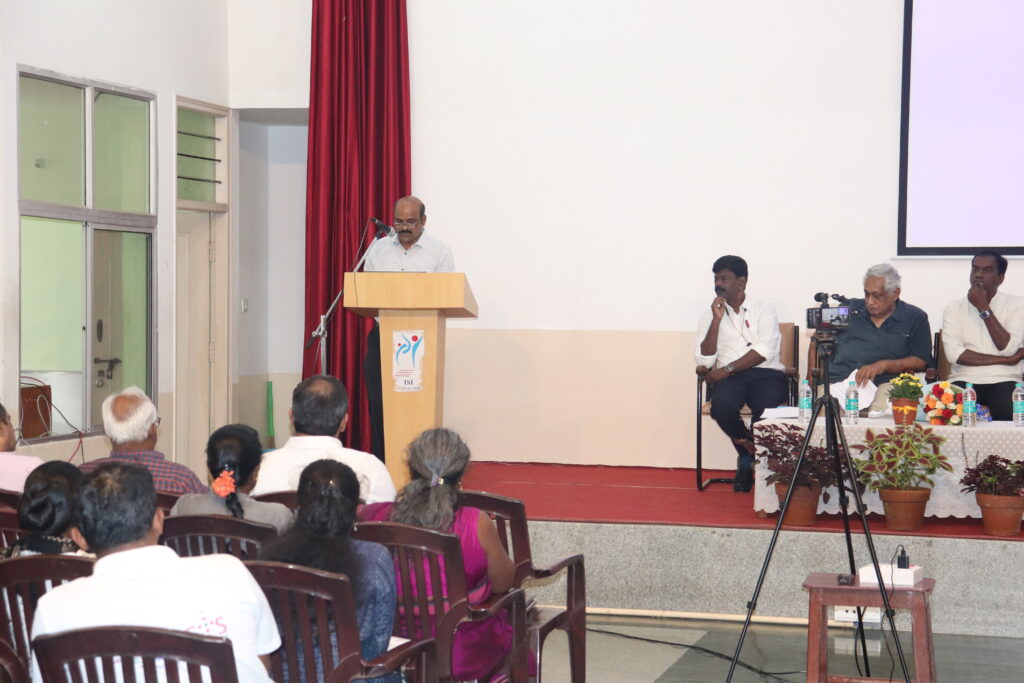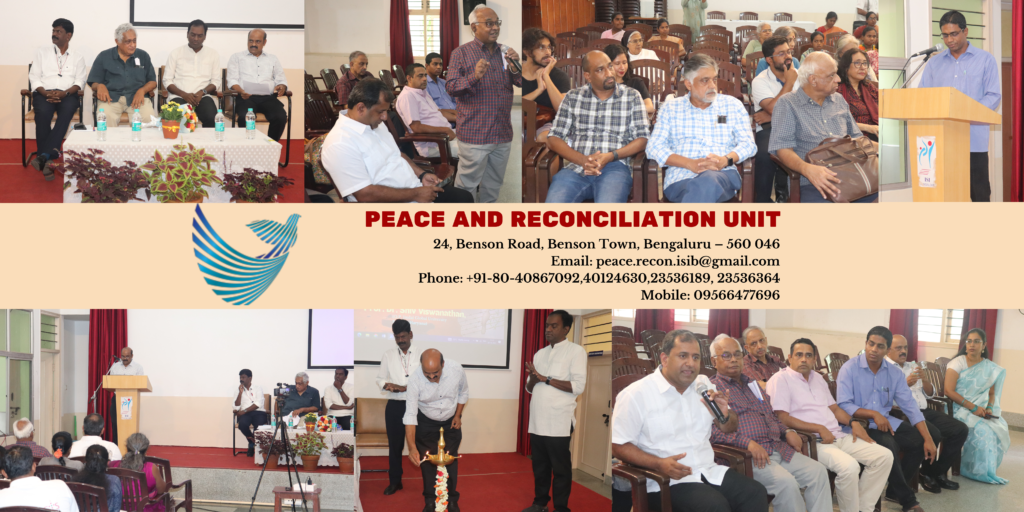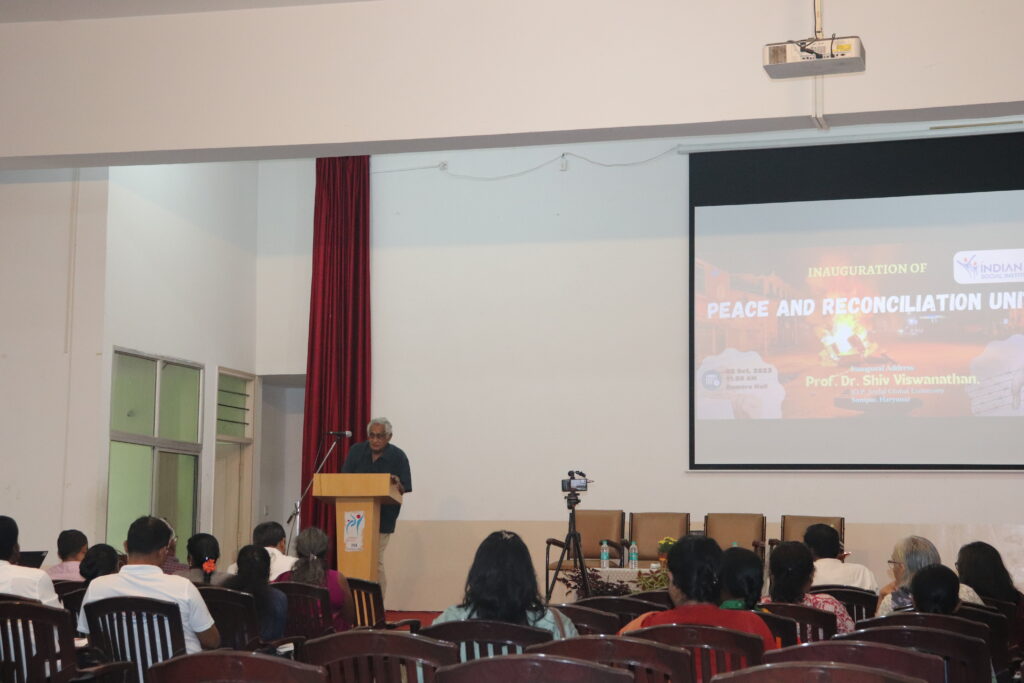


PEACE AND RECONCILIATION UNIT
24, Benson Road, Benson Town, Bengaluru – 560 046
Email: centerforpeace.recon@gmail.com
Phone: +91-80-23536189, 23536364, 40867092,40124630
Web: www.isibangalore.com Mobile: 09566477696
Date: 3rd October 2023
INAUGURATION OF PEACE AND RECONCILIATION UNIT REPORT
Indian Social Institute, Bengaluru with its guiding vision ‘to build an egalitarian and inclusive society by promoting socially conscious and empowered communities’ has ventured yet another significant stage (millstone) by way of installing a functional Unit for Peace and Reconciliation Promotion. The broader aim of the unit is to foster ‘Peace and Reconciliation Social Educational Endeavour in accordance with the guidelines of Universal Apostolic Preferences of the society of Jesus and the South Asian Jesuit Network for Peace and Reconciliation Initiatives.
A formal inauguration of the Peace and Reconciliation Unit was held on 2nd of October 2023.
Rev. Dr. Selvaraj Arulnathan SJ, Director, ISI-B, and Fr. Anthony Dass SJ, Superior, ISI-B, and accompanied with the Administrative and Academic community of Institute, initiated the deliberations of the inaugural function. Dr. Selvaraj Arulnathan SJ announced the inauguration of Peace and Reconciliation Unit at ISI-B and welcomed Dr. S. Lourdunathan as the first Head of the unit.
Prof. Dr. Shiv Viswanathan, O.P. Jindal Global University, Sonipat, Haryana served as the Chief Guest and provided the inaugural address. Prof. Shiv Viswanathan is a well-known scholar Indian and International academics. His scholarly contribution combines concerns related to science, technology, information communication in view of social development. His expertise as public intellectual is benefited both by government and non-governmental agencies in embarking any new initiatives regarding societal developmental concerns.
Prof. Dr. Shiv Viswanathan, in his inaugural address traced the need for Peace and Reconciliation Social Initiatives instrumentalised through social educational research actions and establishing a unit for peace and reconciliation is significant in the context of the need for conceptual clarity in understanding the nature of conflict and the avenues of reconciliation. Tracing the theoretical grounds, he pointed out that the realm of peace and reconciliation is ambiguous and arbitrary and hence necessitates a deconstructive and hermeneutical interventional process. He also insisted the need for ‘cognitive justice’ as the fore ground for social justice and peace and reconciliation initiatives which brings home the imperative of evolving or developing research based social-educational avenues to be actualised by the new unit.
The inaugural function was followed by a consultation held at 2.30 p.m. The consultation was guided by Rev. Dr. Maria Arulraja SJ, the Director of Inter Religious Dialogue centre, Loyola College, Chennai and was facilitated by Dr. S. Lourdunathan. Dr. Selvaraj Arulnathan SJ, Fr. Anthony Dass SJ, Dr. Bonoy, Fr. Francis Balraj, Fr. Mixim Dias and Dr. Dheenabandhu Manchala were the consultants who contributed their expertise in furthering the educational efforts of the Peace and Reconciliation Unit at ISI-B.
Dr. S. Lourdunathan in his discussion paper highlighted the configuration Peace as Prescriptive, performative Reconciliation and Restorative Justice the process exploring it is both a becoming and overcoming and the becoming of humane and the overcoming of the inhumane which is hitherto institutionally reproduced and reconfigured.
Dr. Maria Arulraja in his directive deliberations pointed out that the discursive realm of Peace and Reconciliation is the cultural and social historical traces and such historical traces propel and constitute the multi-faceted conflicts in the Indian society which result in (i) the perpetrators of violence and (2) victims of violence. Addressing conflicts produced by both the perpetrators and victims needs to be clarified and it is but human moral cum theological responsibility. Clarifying the practical and theoretical ethos of conflicts is conditioned by the necessity of endeavouring justice (which is retrospective, restorative and commiserative etc.) especially from the point of view of victim’s consciousness.
Dr. Selvaraj SJ positioned the cultural sources that needs be unearthed to rely upon to address the issue of reconciliation to undo the harm caused by conflicts crisis. Religion, culture social organisations, he said, are conducive or potential both conflict and reconciliation and hence the need to re-search ‘shared cultural realm, namely (visible sites)’ for peace and reconciliation.
Dr. Dheenabandhu Manchala highlighted the cultural of silence, the face of violence and conflicts, especially among the progressive technologically enabled youth and therefore the need for enabling the youth in terms of value-formation as vital. He said, ‘there is a kind of acceptance of injustice and violence and aggression which is diabolic to building up of humane society. The vulnerable-other hence are forced to suffer forms injustice. Reconciliation is the problem of the burden of the victim and oppression is so much internalised by the cultural social structures.
Dr. Bonoy wholeheartedly welcomed the initiative of ISI-B in venturing a unit for peace and reconciliation and he emphasised the need of clarifying our priorities in addressing peace and reconciliation. He also suggested the realm of alternate narratives as a reconstructive process and interdisciplinary approach towards peace and reconciliation. To this, he said, ‘understanding peace and reconciliation’ is the starting point. Viewing reconciliation as a discerning process, He shared his long-standing expertise in the journey of peace and compassion as reconciliation promotion.
Fr. Anthony Dass pointed out that ‘class room’ as the proper ground for peace and reconciliation program. In this line, the discussion further reflected on the issue of ‘communicating’ with secular universities and educational avenues’ to broad base peace and reconciliation programs., Fr. Mixim Dias explored the possibility of ‘networking with’ for upholding peace and reconciliation. Fr. Francis Balraj suggested the need for promoting secular volunteer team for actualizing peace and reconciliation process.
Thanking and each other and wishing cooperation of each other, the day ended with a prayer of gratitude to the Divine Guidance.
S. Lourdunathan
Head
